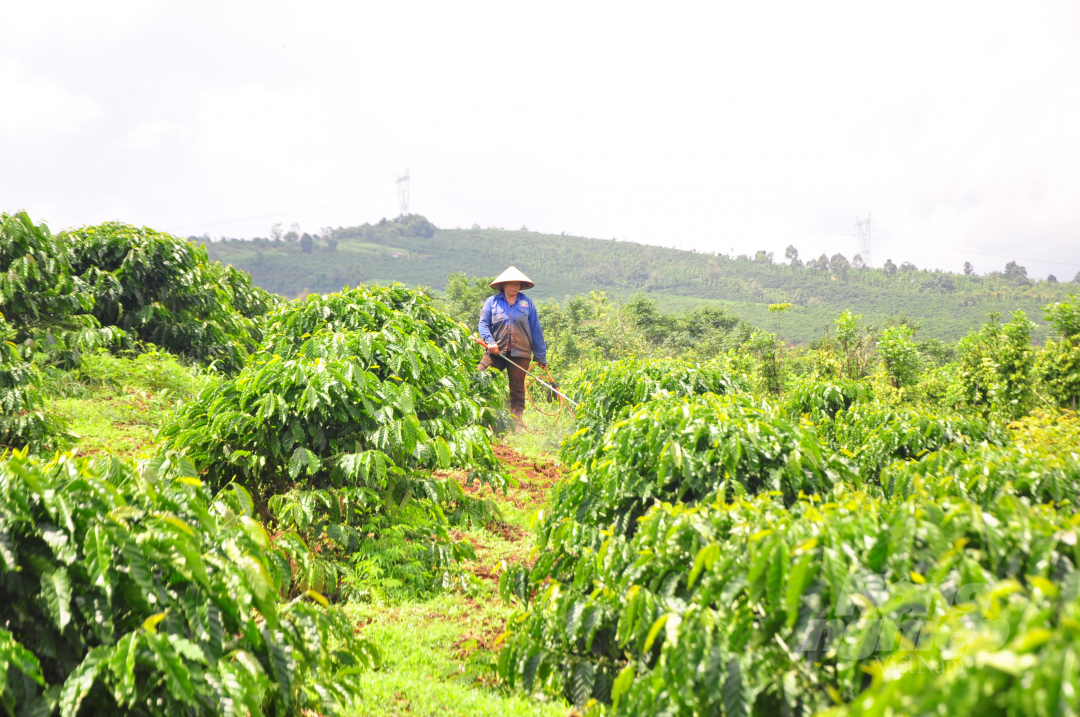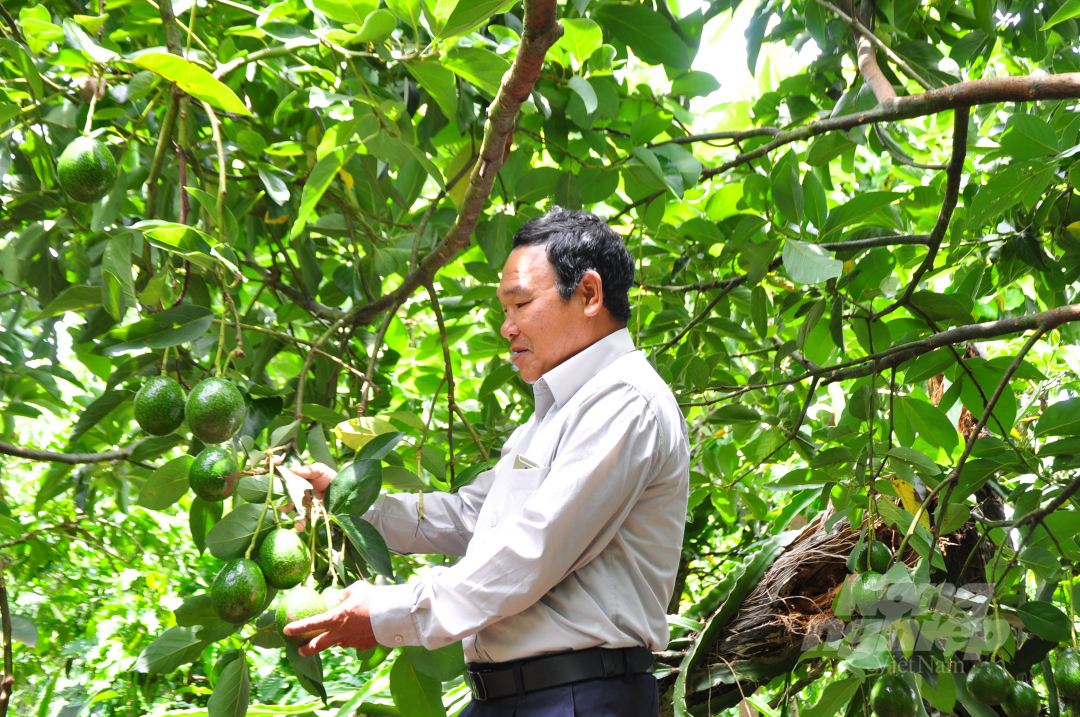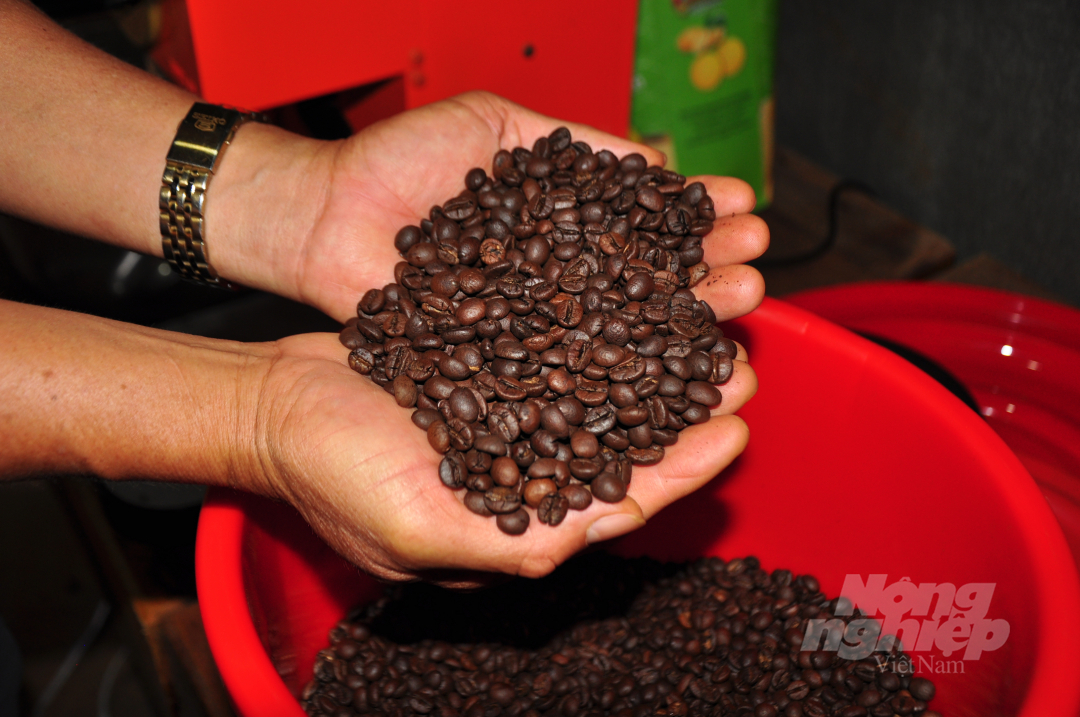November 28, 2025 | 01:23 GMT +7
November 28, 2025 | 01:23 GMT +7
Hotline: 0913.378.918
November 28, 2025 | 01:23 GMT +7
Hotline: 0913.378.918

The VnSAT project built models of re-cultivated coffee, landscape coffee and supported the establishment of farmer organizations to guide the production chain. Photo: M.H.
In Tan Nghia commune (Di Linh district, Lam Dong province), the Vietnam - Sustainable Agriculture Transformation Project (VnSAT Project) has had many activities to support farmers and cooperatives in coffee production and value chain creation.
The VnSAT project started to be implemented in Tan Nghia commune in 2017. At that time, the project built models of re-cultivated coffee, landscape coffee and supported the establishment of farmer organizations to guide the production chain.
Mr. Nguyen Minh Ngoc, Director of Tan Nghia Cooperative (located in Tan Nghia commune) said that before the VnSAT project was implemented, people traditionally produced coffee on small scales.
By 2017, the VNSAT project started to be implemented in the commune. Since then, the VnSAT project has had many activities to support farmers. The models that the project builds all contribute greatly to coffee development.
"People today have focused on improving the soil, selecting high-quality varieties for replanting, and carrying out production and care of coffee according to technical standards. Therefore, the tree thrives and is productive. The yield is also higher," said Mr. Nguyen Minh Ngoc.
Also according to Mr. Nguyen Minh Ngoc, Tan Nghia Cooperative was established by the VnSAT project and has now had over 100 members and very good production cooperation. The VnSAT project, in addition to disseminating knowledge, science, and technology, also supports cooperatives in building infrastructure for production. This creates a premise to help the cooperative aim for methodical, large-scale production and sustainable development in the future.

The VnSAT project has helped people organize cooperatives and build value chains. Photo: M.H.
Mr. Duong Xuan Tien, Vice Chairman of the People's Committee of Tan Nghia Commune shared that since the VnSAT project invested, the commune's economy has developed a lot. Support activities of the Project such as investing in re-cultivation coffee models, saving watering, and scientific and technical training activities have helped people consolidate their knowledge for better farming.
"Especially, the VnSAT project has helped people organize cooperatives and build value chains. This is a very practical activity in sustainable coffee development in the locality. I hope the VnSAT Project will support the development of other fruit trees" added Mr. Duong Xuan Tien.
The VnSAT project has supported local farmers to build rural roads for production. Moreover, the VnSAT project has also implemented and supported farmers to access loans for investment in replanting, fertilizer costs, and production machinery.
In Nam Ha commune (Lam Ha district, Lam Dong province), the VnSAT project has carried out a series of activities to support farmers and cooperative groups. Mr. Tieu Van Binh, Chairman of Nam Ha Commune People's Committee, said that after the VnSAT Project implemented training sessions to disseminate knowledge, science, and technology, coffee productivity increased. Especially in this 2021 crop, the output and productivity are up to 30% higher than in previous years.
According to Mr. Binh, currently, some facilities built by the VnSAT project have started to operate effectively. In particular, the VnSAT project has been investing in Nam Ha commune about 5 kilometers of intra-field roads, ensuring convenient means of transportation, serving coffee production better and better.

The VnSAT project helps cooperatives and cooperative groups perfect the coffee processing process, thereby contributing to improving coffee quality. Photo: M.H.
By now, the VnSAT project has brought great economic benefits to those participating in the project programs and spread to the community, forming an advanced and highly effective farming method.
Mr. Nguyen Van Chau, Deputy Director of the Department of Agriculture and Rural Development of Lam Dong province commented that over the past time, the Lam Dong VnSAT Project has supported a series of farmer organizations on the sustainable coffee production process.
In addition, the project also supports cooperatives and cooperative groups to build a system of warehouses, drying yards, dryers, pre-processing machines, etc. to help cooperatives and cooperative groups perfect the coffee processing process, thereby contributing to improving coffee quality.
As a result, models such as re-cultivation and sustainable coffee built in Lam Dong province have achieved high efficiency and have great spread in the community.
"In Lam Dong province, over the past time, the VnSAT project has been a bridge to help cooperatives, coffee production cooperative groups and input material suppliers and coffee processing and roasting enterprises connect, forming a connection chain from production to consumption, to improve the value chain," shared Mr. Nguyen Van Chau.
The Vietnam - Sustainable Agriculture Transformation Project (VnSAT Project) is mainly funded by the World Bank with a total capital equivalent to about US$ 301 million, implemented from 2015 to 2020. The VnSAT project's strategic orientation is to support the implementation of the Government's Agricultural Sector Restructuring Scheme through strengthening the sector's institutional capacity; innovating sustainable farming methods and enhancing value chains for the rice and coffee industries in Vietnam's two main commodity-producing regions, the Mekong Delta and the Central Highlands.
After 5 years of implementation, the VnSAT project has changed farming practices, contributing to improving economic efficiency for Vietnamese farmers.
Translated by Ha Phuc

(VAN) According to Mr. Vo Minh Thanh, Director of the Tay Ninh Department of Agriculture and Environment, Resolution 57 has created a new development pathway for the locality, shifting from traditional toward modern agriculture.
/2025/11/26/4909-2-154329_878.jpg)
(VAN) Pearl grouper farming in HDPE cages not only delivers economic efficiency but also contributes to protecting the environment, creating jobs, and promoting marine-based experiential tourism.

(VAN) The model of making a living under the forest canopy through the agroforestry system in Van Son commune, Bac Ninh province, is expected to generate an annual income of approximately VND 30 million/ha.

(VAN) Many enterprises in Can Tho are harnessing natural energy and reducing greenhouse gas emissions in their production processes, thereby contributing to the promotion of a sustainable green transition.
/2025/11/24/3536-2-112800_176.jpg)
(VAN) Dong Nai now has tens of thousands of hectares of forests certified for sustainable management, and this area will continue to be expanded in the coming period.

(VAN) Vinh Ha hamlet (Dai Xuyen commune, Hanoi) is shifting away from small-scale farming as households adopt bioscurity into their breeder chicken models.

(VAN) Heavy rains make aquatic species more vulnerable to disease. Proactive water management and high-tech systems help farmers prevent outbreaks and protect yields.